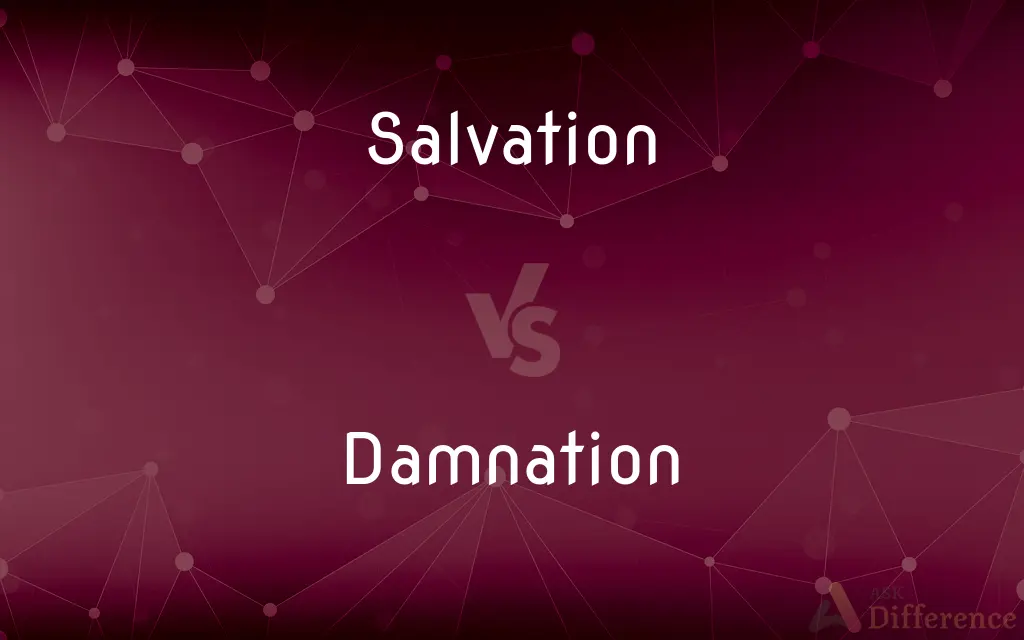Salvation vs. Damnation — What's the Difference?
By Fiza Rafique & Urooj Arif — Updated on March 24, 2024
Salvation is the deliverance from sin and its consequences, often viewed as being granted eternal life, while damnation is the condemnation to eternal punishment.

Difference Between Salvation and Damnation
Table of Contents
ADVERTISEMENT
Key Differences
Salvation, in many religious traditions, represents the act of being saved or protected from harm, specifically in a spiritual context, it implies being saved from sin and its consequences. This concept is pivotal in Christianity, where salvation is often associated with faith, grace, and the afterlife. Damnation, on the other hand, refers to eternal punishment and separation from divine grace, often viewed in contrast to salvation as the ultimate consequence for sin or rejection of divine principles.
The path to salvation is typically associated with faith, repentance, and adherence to religious teachings, suggesting a journey towards redemption and divine acceptance. Damnation, whereas, is often seen as the result of a persistent refusal to seek forgiveness or to follow the moral and ethical guidelines set forth by a religious tradition, leading to a state of eternal separation from the divine.
Salvation is frequently depicted as a state of peace, joy, and eternal life, offering believers the promise of an afterlife in the presence of the divine. Damnation, in contrast, is characterized by suffering, remorse, and the absence of hope, described in many religious texts as a place or state of torment and despair.
The concept of salvation emphasizes the merciful aspect of the divine, highlighting forgiveness, love, and the possibility of redemption. Damnation, on the other hand, underscores the justice aspect of the divine, the idea that actions and choices have eternal consequences, reflecting a balance between mercy and justice in religious doctrines.
In discussing salvation and damnation, it's important to note that interpretations and understandings vary significantly across different religions and within sects of the same religion. While Christianity offers a well-defined doctrine of salvation through Jesus Christ, other religions have their own concepts of salvation and damnation, each with unique perspectives on afterlife, moral living, and the nature of the divine.
ADVERTISEMENT
Comparison Chart
Definition
Deliverance from sin and its consequences
Condemnation to eternal punishment
Associated With
Faith, grace, repentance
Sin, rejection of divine principles
Outcome
Eternal life, peace, and presence of the divine
Eternal punishment, suffering, and absence of the divine
Reflects
Divine mercy and love
Divine justice and the consequences of choices
Variability
Concepts vary across religions, often emphasizing redemption
Universally seen as undesirable, with variations in depiction
Compare with Definitions
Salvation
Varies across religions.
Salvation in Buddhism involves achieving Nirvana, a state free from suffering and desire.
Damnation
Separation from the divine.
Those condemned face eternal separation from divine grace and presence.
Salvation
Requires faith and repentance.
Salvation is often said to be attained through sincere faith and turning away from sin.
Damnation
Eternal punishment.
Damnation is feared as the ultimate penalty for unrepented sin.
Salvation
Associated with eternal life.
The promise of salvation offers believers hope for an afterlife in paradise.
Damnation
Result of rejecting divine principles.
Damnation is often described as the consequence of turning away from the path of righteousness.
Salvation
Signifies divine mercy.
The concept of salvation underscores the merciful nature of the divine, offering forgiveness.
Damnation
Reflects divine justice.
Damnation serves as a reminder of the divine's justice in punishing wrongdoing.
Salvation
Spiritual deliverance.
Many seek salvation through prayer and good deeds.
Damnation
Depicted in religious texts.
Various religions describe damnation through vivid imagery of suffering and despair.
Salvation
Salvation (from Latin: salvatio, from salva, 'safe, saved') is the state of being saved or protected from harm or a dire situation. In religion and theology, salvation generally refers to the deliverance of the soul from sin and its consequences.
Damnation
Damnation (from Latin damnatio) is the concept of divine punishment and torment in an afterlife for actions that were committed on Earth. In Ancient Egyptian religious tradition, citizens would recite the 42 negative confessions of Maat as their heart was weighed against the feather of truth.
Salvation
Preservation or deliverance from destruction, difficulty, or evil.
Damnation
The act of damning or the condition of being damned.
Salvation
A source, means, or cause of such preservation or deliverance.
Damnation
Condemnation to everlasting punishment; doom.
Salvation
Deliverance from the power or penalty of sin; redemption.
Damnation
Everlasting punishment.
Salvation
In religions such as Hinduism and Buddhism, deliverance from the cycle of rebirth and suffering.
Damnation
Failure or ruination incurred by adverse criticism.
Salvation
The agent or means that brings about such deliverance.
Damnation
Used to express anger or annoyance. See Note at tarnation.
Salvation
(religion) The process of being saved, the state of having been saved (from hell).
Collective salvation is not possible without personal salvation, but the latter is achievable.
Damnation
The state of being damned; condemnation; openly expressed disapprobation.
Salvation
The process of being restored or made new for the purpose of becoming saved; the process of being rid of the old poor quality conditions and becoming improved.
Damnation
(religion) Condemnation to everlasting punishment in the future state, or the punishment itself.
Salvation
(rare) To save, in the religious sense; to bring to salvation.
Damnation
Expressing annoyance or disappointment; damn; dammit.
Salvation
The act of saving; preservation or deliverance from destruction, danger, or great calamity.
Damnation
The state of being damned; condemnation; openly expressed disapprobation.
Salvation
Saving power; that which saves.
Fear ye not; stand still, and see the salvation of the Lord, which he will show to you to-day.
Damnation
Condemnation to everlasting punishment in the future state, or the punishment itself.
How can ye escape the damnation of hell?
Wickedness is sin, and sin is damnation.
Salvation
(Christianity) the act of delivering from sin or saving from evil
Damnation
A sin deserving of everlasting punishment.
The deep damnation of his taking-off.
Salvation
A means of preserving from harm or unpleasantness;
Tourism was their economic salvation
They turned to individualism as their salvation
Damnation
The act of damning
Salvation
The state of being saved or preserved from harm
Damnation
The state of being condemned to eternal punishment in Hell
Salvation
Saving someone or something from harm of from an unpleasant situation;
The salvation of his party was the president's major concern
Common Curiosities
How do different religions view salvation?
Views on salvation vary significantly; for instance, Buddhism sees salvation as achieving Nirvana, while in Hinduism, it involves breaking the cycle of rebirth through moksha.
Can one be saved from damnation?
Many religions offer the possibility of redemption from damnation through repentance, conversion, or following specific religious rites or practices.
What leads to salvation according to Christian belief?
In Christianity, salvation is typically believed to be granted through faith in Jesus Christ, repentance, and living according to Christian teachings.
What role does free will play in salvation and damnation?
Free will is central to many religious teachings on salvation and damnation, highlighting the importance of individual choices in determining one's eternal fate.
How do modern interpretations of these concepts differ from traditional ones?
Modern interpretations may emphasize the symbolic or metaphorical nature of salvation and damnation, focusing on personal growth and ethical living.
Are there different levels of salvation or damnation?
Some traditions suggest varying degrees of reward or punishment in the afterlife, based on one's life actions and spiritual growth.
Is damnation a choice?
Many religious teachings suggest that damnation results from a conscious choice to reject divine guidance and persist in sin.
Do all religions have a concept of damnation?
Not all religions have a concept of damnation; some focus on moral and ethical living with different interpretations of the afterlife or spiritual progression.
Is damnation permanent?
In many religious traditions, damnation is viewed as a permanent state, emphasizing the importance of choices made in life.
What historical events have shaped the concept of damnation?
Historical events, such as religious reforms, doctrinal debates, and philosophical discussions, have influenced the evolution of the concept of damnation.
Can salvation be lost once attained?
Beliefs vary; some argue that salvation, once granted, is secure, while others believe it can be lost through subsequent actions or lack of faith.
How is salvation achieved in Islam?
In Islam, salvation is achieved through submission to Allah, following the Five Pillars of Islam, and living a righteous life.
How do cultural beliefs influence views on salvation and damnation?
Cultural beliefs and traditions can significantly influence how salvation and damnation are understood and practiced, reflecting societal values and concerns.
What is universal salvation?
Universal salvation is the belief that all souls will eventually be saved and attain eternal life, regardless of their actions or beliefs in life.
What is the significance of salvation in daily life?
For believers, the pursuit of salvation influences moral decisions, providing a framework for ethical behavior and spiritual fulfillment.
Share Your Discovery

Previous Comparison
Offshoring vs. Outsourcing
Next Comparison
Skid vs. SlipAuthor Spotlight
Written by
Fiza RafiqueFiza Rafique is a skilled content writer at AskDifference.com, where she meticulously refines and enhances written pieces. Drawing from her vast editorial expertise, Fiza ensures clarity, accuracy, and precision in every article. Passionate about language, she continually seeks to elevate the quality of content for readers worldwide.
Co-written by
Urooj ArifUrooj is a skilled content writer at Ask Difference, known for her exceptional ability to simplify complex topics into engaging and informative content. With a passion for research and a flair for clear, concise writing, she consistently delivers articles that resonate with our diverse audience.














































